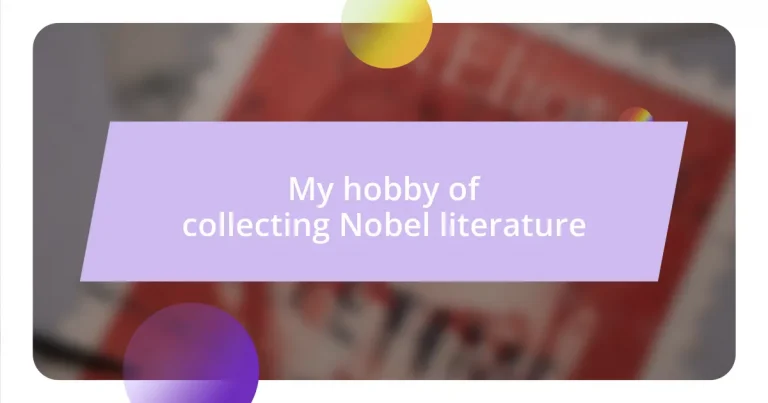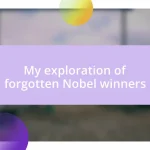Key takeaways:
- Collecting Nobel literature is a personal journey that reflects emotional connections and the impact of authors on society.
- Selecting meaningful works involves considering personal relevance, diversity of voices, and the emotional resonance of themes.
- Building a personal library requires thoughtful organization and the creation of an inviting space that inspires reading.
- Sharing your collection and participating in literary communities enhances understanding and fosters connections with others who share a passion for literature.
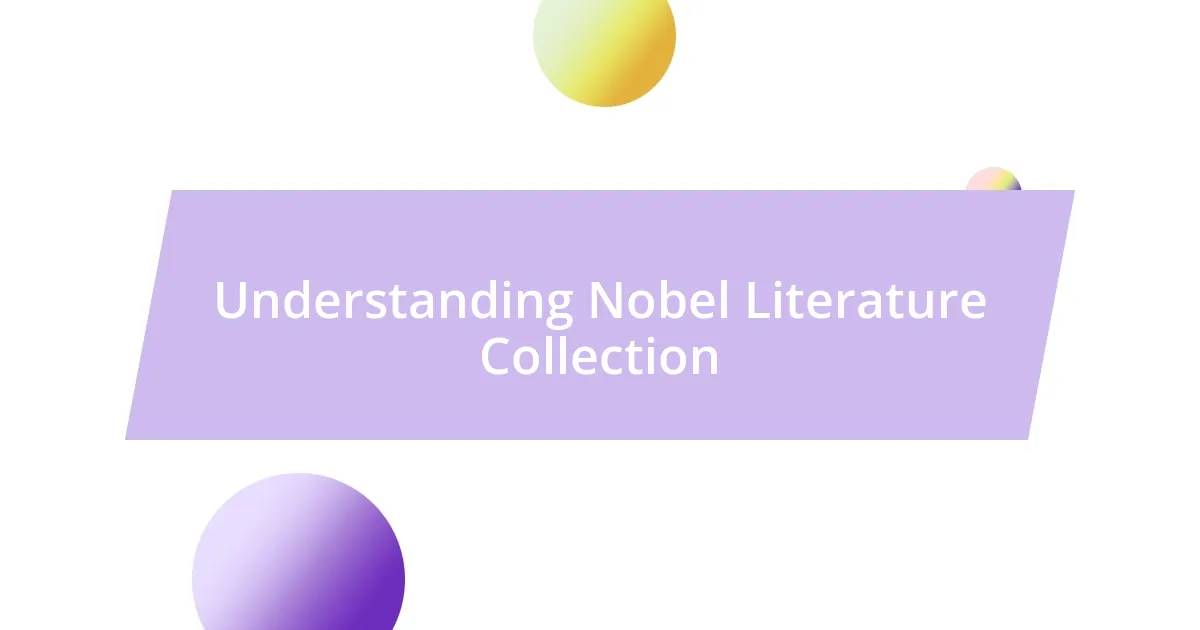
Understanding Nobel Literature Collection
When I first dove into collecting Nobel literature, it felt like embarking on a treasure hunt through human experience and emotion. Each book carried a story, not just of the narrative within its pages but of the author’s journey and the impact of their words on society. It’s fascinating to think about how these writers tackled profound themes—what does it mean to change the world with a few carefully chosen words?
As I flipped through the pages of my Nobel collection, I realized that every author represents a unique voice in the symphony of literature. For instance, reading Gabriel García Márquez’s works made me reflect on the power of magical realism and how it intertwines with reality. Don’t you find it remarkable how writers can transport us to different worlds while exploring the depths of our own?
Collecting these books isn’t just about building a library; it’s about preserving the legacy of thought and creativity. I often find myself wondering: how might the themes in these stories resonate with future generations? Each title, whether a classic like Toni Morrison’s “Beloved” or a contemporary masterpiece, connects us to a broader dialogue about humanity—and that, to me, is what makes this collection so worthwhile.
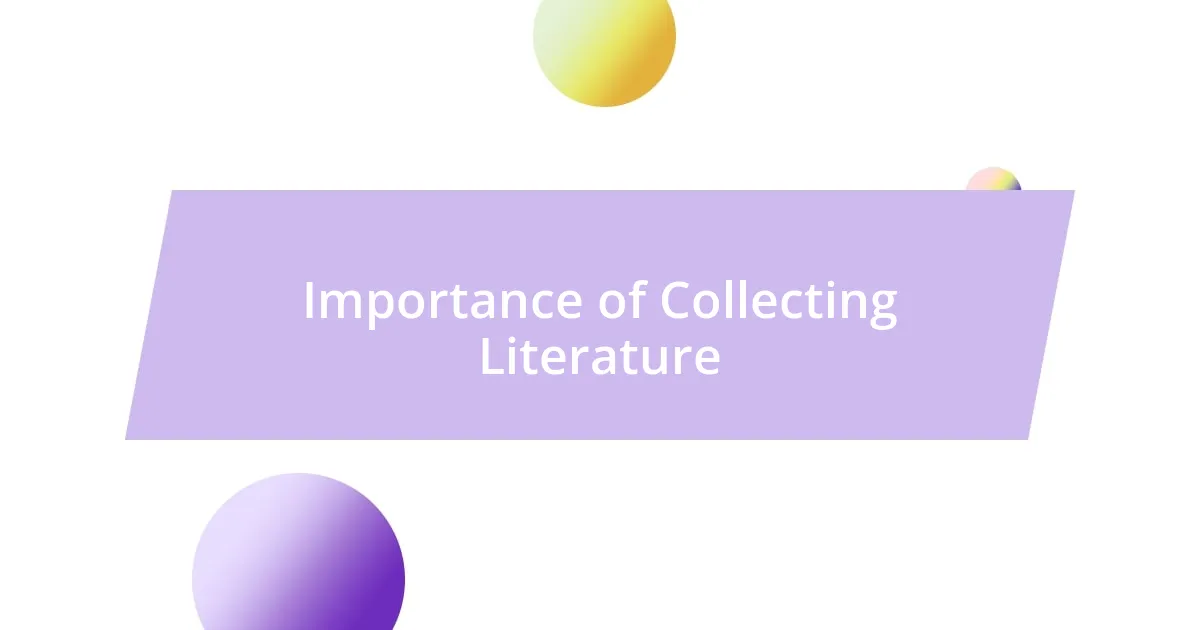
Importance of Collecting Literature
Collecting literature is a way to connect with the voices of the past, allowing me to hear their thoughts, struggles, and dreams. Each book serves as a portal to another time and place, allowing me to engage deeply with diverse cultures and ideas. I remember the first time I read a novel by Kazuo Ishiguro; I felt transported into his intricate world, grappling with themes of memory and loss that resonate deeply in my own life.
Furthermore, building a collection of Nobel literature gives me a sense of responsibility. I often think about how these works reflect the societal issues that shaped them. For example, reading Elfriede Jelinek’s works makes me consider the roles of gender and power dynamics still relevant today. I cherish each addition to my collection not just for its immediate beauty but for its potential to inspire conversations that further our understanding of the world.
This hobby doesn’t merely satisfy my love for books; it also enriches my intellectual life. I find that discussing these Nobel laureates with fellow enthusiasts often leads to profound exchanges—we explore themes that challenge the status quo or illuminate the human condition. I cherish those moments when we dive deep into a particular Nobel work, often uncovering insights that change how I view the world around me.
| Aspect | Importance |
|---|---|
| Connection to History | Each book provides insight into the era it was written, helping to preserve cultural heritage. |
| Diversity of Perspectives | Collecting a variety of works allows us to understand and appreciate different cultural narratives. |
| Intellectual Growth | Engaging with complex themes enhances critical thinking and broadens our worldview. |
| Community Engagement | Sharing and discussing literature fosters connections with fellow enthusiasts and encourages dialogue. |
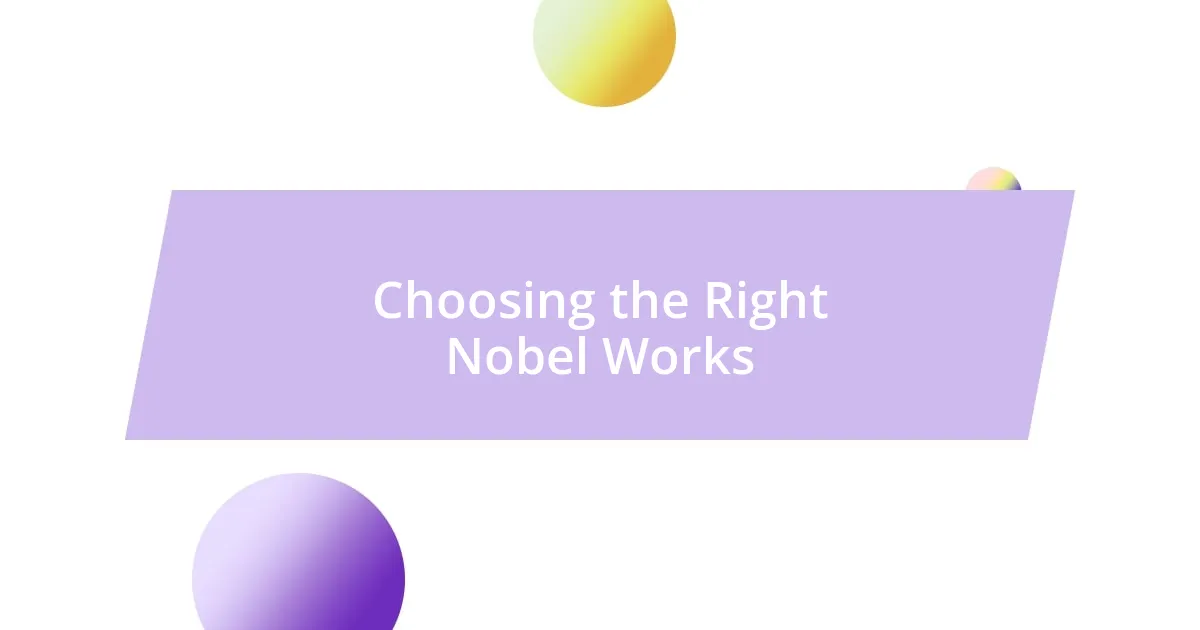
Choosing the Right Nobel Works
Choosing the right Nobel works for your collection can be a delightful yet daunting task. It’s not just about the titles that appear on a prestigious list; each book must resonate with you on a personal level. I fondly remember my first encounter with José Saramago’s “Blindness.” The raw emotion and deep exploration of human nature captivated me, and I knew I wanted that book on my shelf as a constant reminder of resilience and insight.
To select the most meaningful titles, consider a few aspects that can guide your choices:
- Personal Connection: Think about themes that resonate with your own experiences or beliefs.
- Diversity of Voices: Embrace authors from various backgrounds to enrich your understanding of different cultures.
- Literary Impact: Assess the influence a particular work had on the field or its relevance today.
- Emotional Resonance: Look for books that invoke strong feelings or inspire profound reflections on life.
When I browse through potential additions for my collection, I often find myself recalling moments from my life when a certain theme or concept clicked into place. That level of connection energizes my search, making each discovery feel like adding a piece to my own narrative.
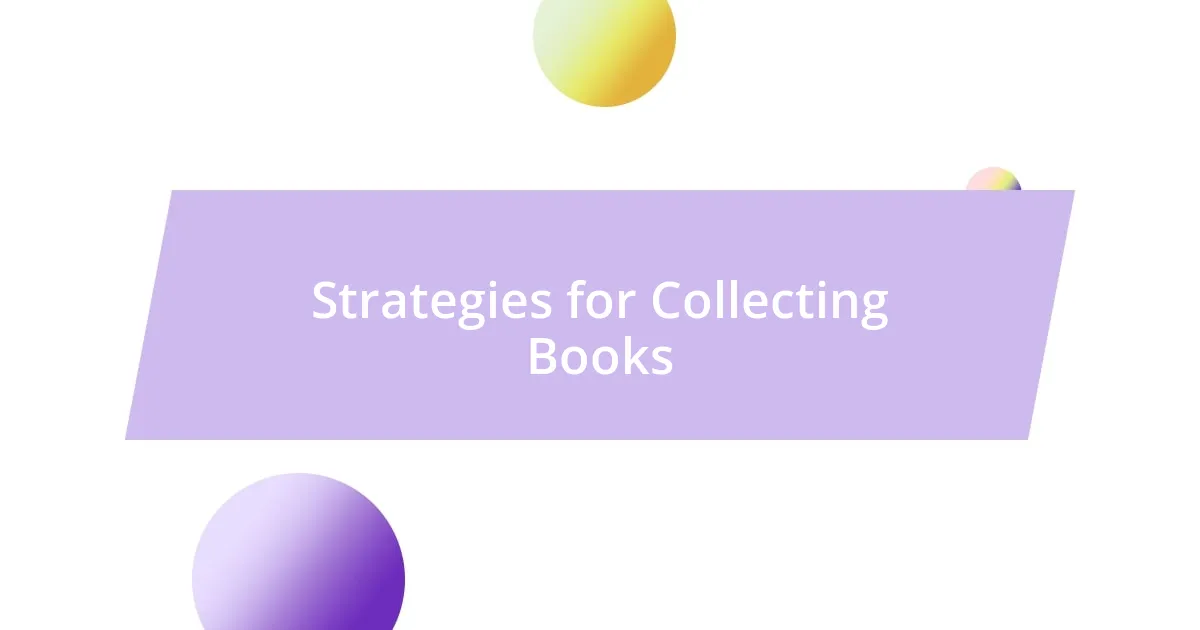
Strategies for Collecting Books
Finding the right strategies for collecting books can transform the experience from mere accumulation to a purposeful journey. I often begin with a clear focus on what I truly want to collect, whether it’s Nobel laureates or specific themes that resonate with my experiences. For instance, my strategy often includes setting aside a fixed budget each month for book purchases, which keeps my collection growing without overwhelming my finances.
One approach I highly recommend is to utilize online platforms and local book fairs to discover hidden gems. I remember stumbling upon a quaint bookshop during a weekend trip, where I found a rare first edition of Toni Morrison’s “Beloved.” The thrill of that discovery still gives me goosebumps! Can you imagine that feeling? It’s not only about the book itself but the stories and memories tied to where you find them.
Additionally, joining clubs or online forums dedicated to literature can be incredibly enriching. I’ve had countless enriching discussions with members about lesser-known works by Nobel winners. Each conversation has sparked new insights and deepened my appreciation for the literature, reminding me that collecting is also about building a dialogue around the books we love. How often do we hear that a simple chat can lead to the most profound insights? I’ve learned not to underestimate the power of community in nurturing my collection.
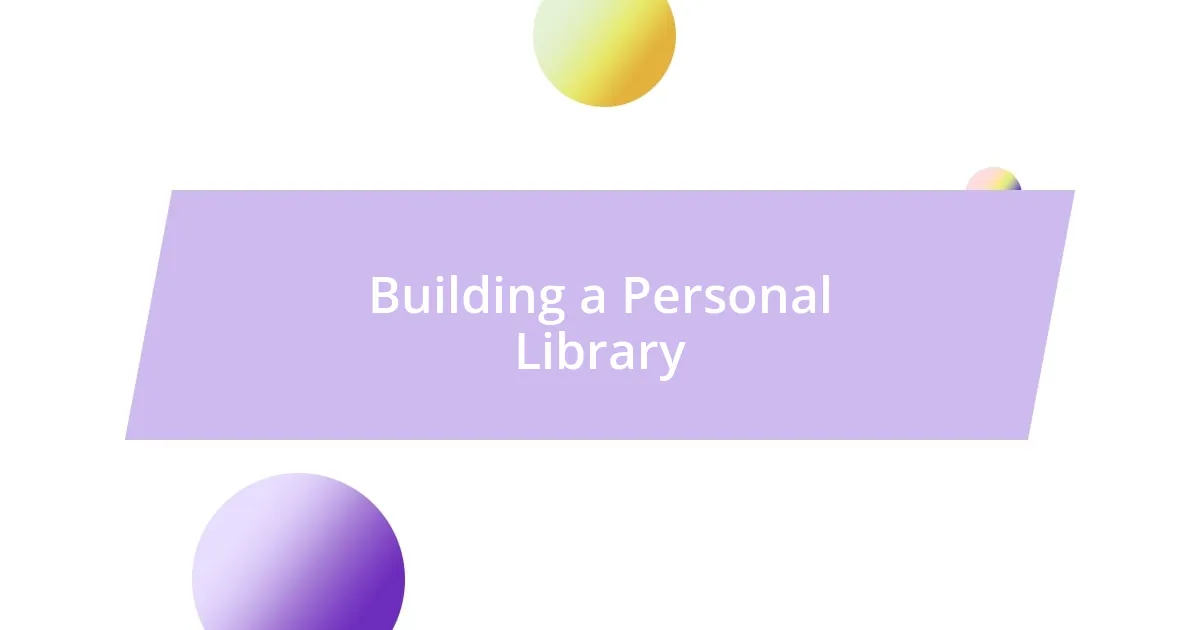
Building a Personal Library
Building a personal library is like constructing a sanctuary filled with treasures that resonate with your soul. I recall the day I discovered a dusty old bookstore tucked away in a narrow alley. As I pulled a slightly worn copy of Gabriel García Márquez’s “One Hundred Years of Solitude” from the shelf, I felt an undeniable connection to its pages. That moment solidified my mantra: every book must have a story behind it, just like the memories I want my library to hold.
To create a library that truly reflects who you are, think about the overall ambiance you want to achieve. Do you envision a cozy nook filled with comfortable cushions, perfect for long reading sessions? Or perhaps a modern display showcasing vibrant covers? I once rearranged my collection based in part on the colors of the spines, and it transformed my reading space into a visual feast. It’s about more than just words on a page; it’s about crafting an environment that inspires you to dive into each volume.
As you gather your books, don’t underestimate the importance of organization. I may have initially shelved my collection randomly, but after some trial and error, I discovered that categorizing by themes or authors not only helps locate titles easily but also sparks new reading journeys. When I notice a cluster of existential themes, it often nudges me to reflect on my own life. So, how do you want your library to speak to you? Finding that personal touch can make your literary collection a true reflection of your journey.
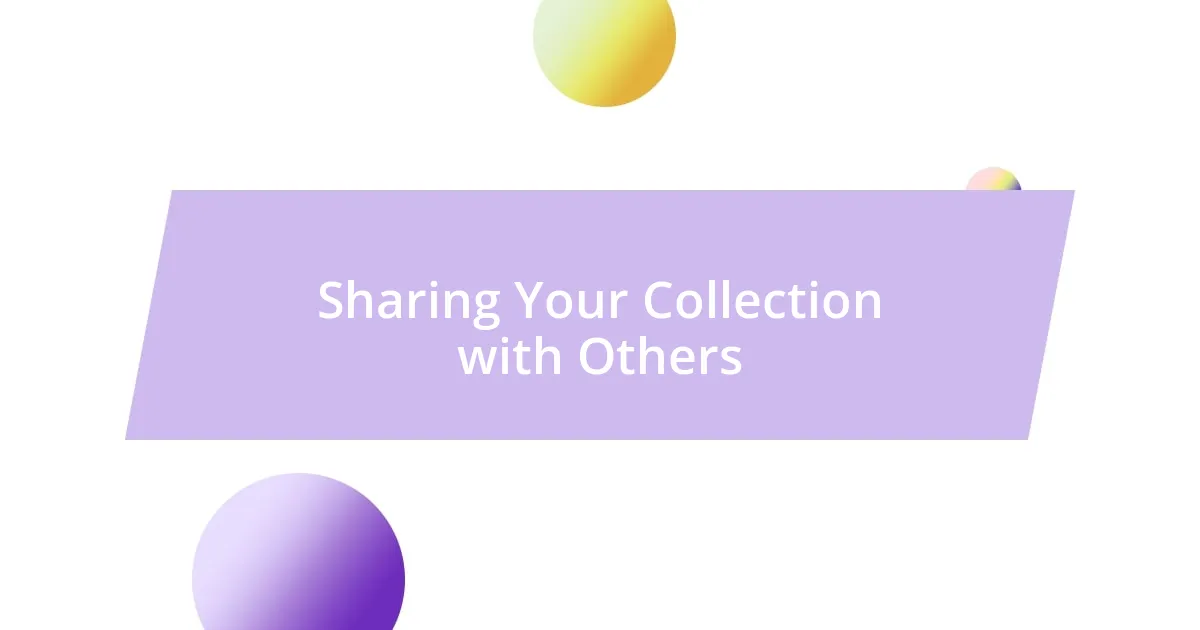
Sharing Your Collection with Others
Sharing your collection can be one of the most rewarding aspects of being a literature enthusiast. I remember hosting a small gathering of friends where I showcased some unique editions from my collection. The excitement in the room was palpable as I shared the stories behind each book—it felt like unveiling pieces of my own journey. Have you ever thought about how sharing these personal narratives can turn mere acquaintances into lifelong friends?
Participating in book clubs has also greatly enriched my experience. Just last month, I led a discussion on a collection of short stories by Alice Munro. Hearing others offer their interpretations not only broadened my perspective but also deepened my connection to the literature. Isn’t it fascinating how each person’s background adds a new layer to a story? These exchanges transformed my simple appreciation into a deeper understanding of the themes at play.
In addition, social media platforms have become a vibrant space for sharing my collection. I often post pictures and anecdotes about my latest finds, inviting others to share their own treasures. One time, a follower reached out after seeing my post on a particularly rare book, revealing her personal connection to the author. This unexpected dialogue fueled my passion for collecting, reminding me that books can truly spark conversations that go beyond the text. How do you think your collection can connect you with others in ways you never imagined?
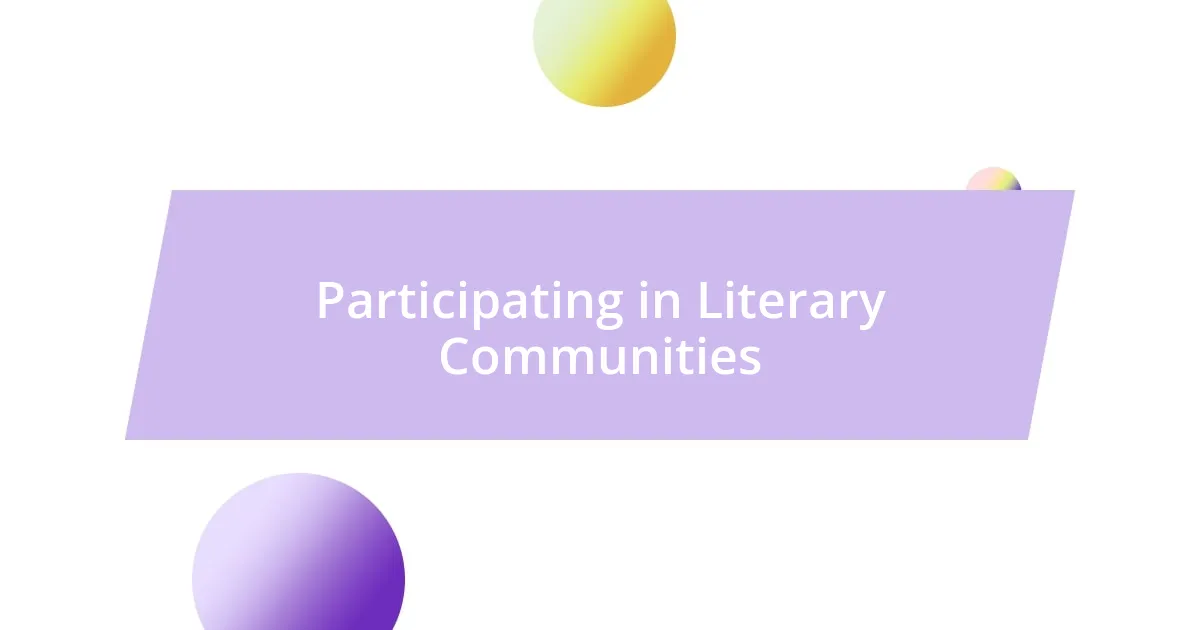
Participating in Literary Communities
Participating in literary communities has opened doors I never knew existed. I vividly recall a lively online forum dedicated to Nobel Prize winners. Sharing my thoughts on a particularly provocative novel by Kazuo Ishiguro led to an incredible exchange of ideas. It was fascinating to see how different interpretations can emerge from a single text. Have you ever found that a simple comment can spark a profound discussion?
Joining local literary events is another way I’ve immersed myself in these communities. At a recent poetry reading, the atmosphere was electric. As I listened to poets recite their heartfelt verses, I felt connected to everyone in that room, united by our love for creativity. Isn’t it amazing how literature can bridge gaps between strangers? It reminded me that every book holds the potential to unite diverse voices in conversation.
Even volunteering at community literacy programs has allowed me to engage with fellow literary enthusiasts. I attended a workshop where participants shared their personal stories and reading journeys. One woman spoke passionately about how a novel changed her life—her emotion was contagious. It got me thinking about the impact literature can have, not just on our minds, but on our hearts. What stories are waiting to be uncovered in your community?












